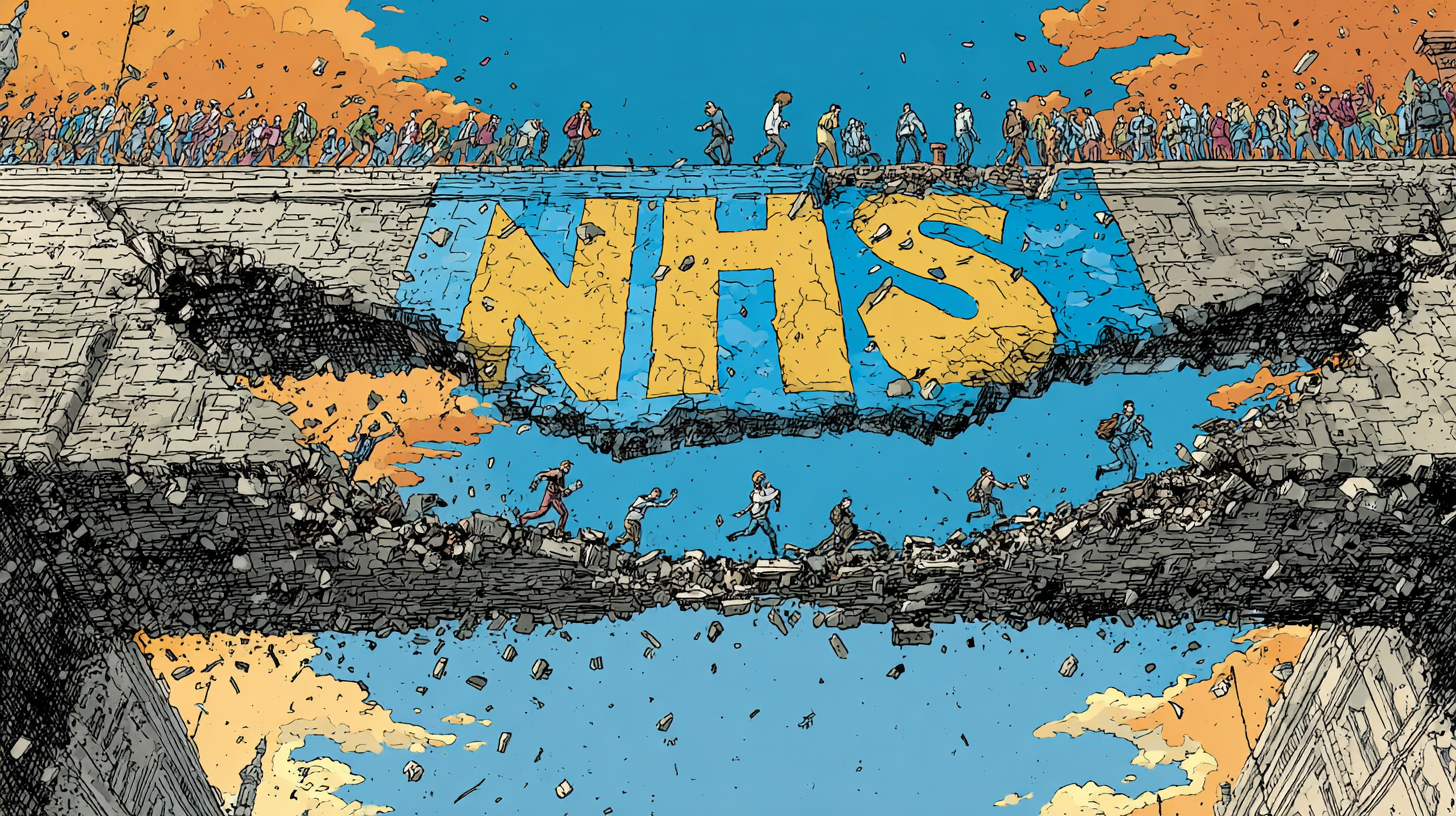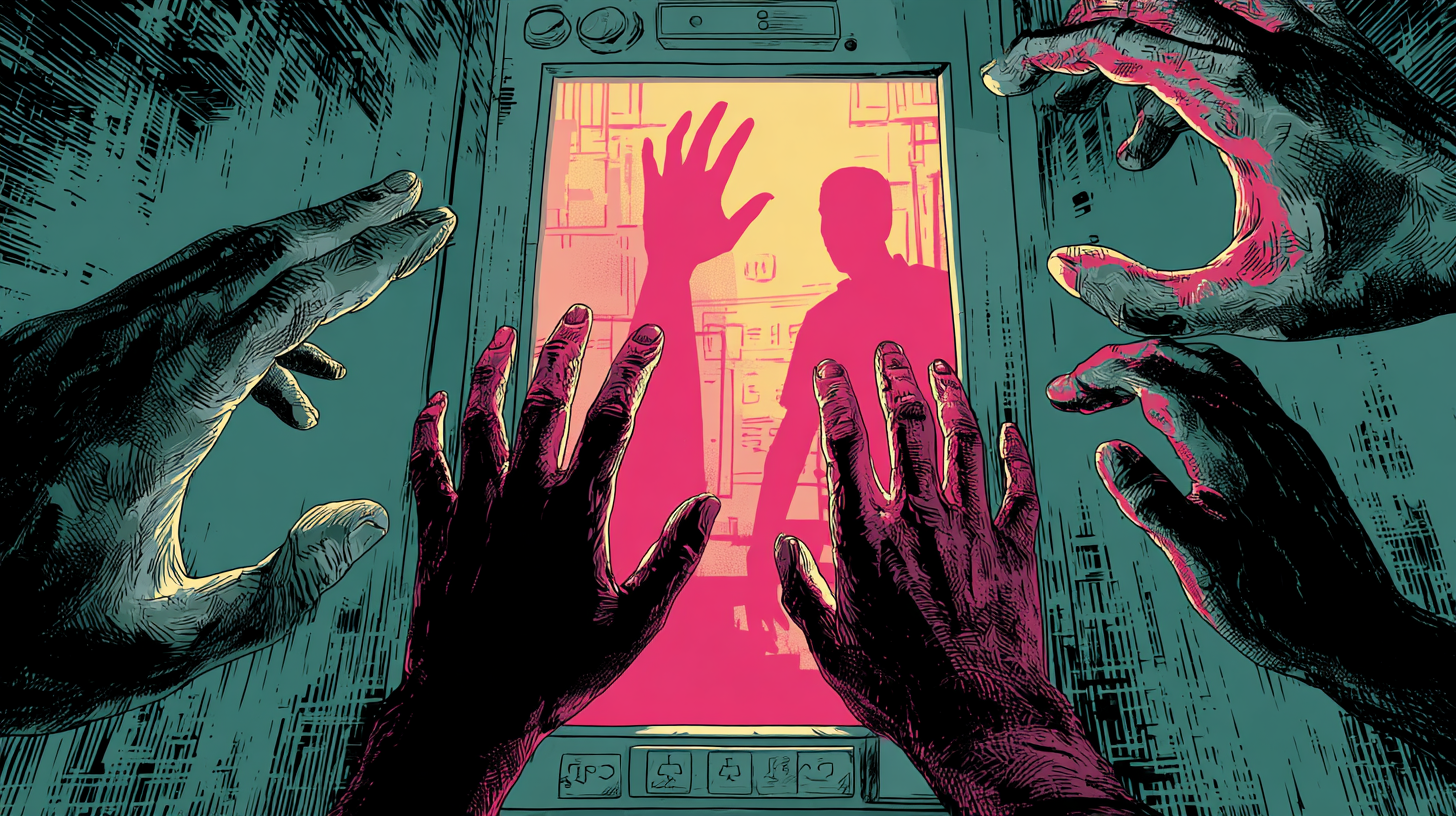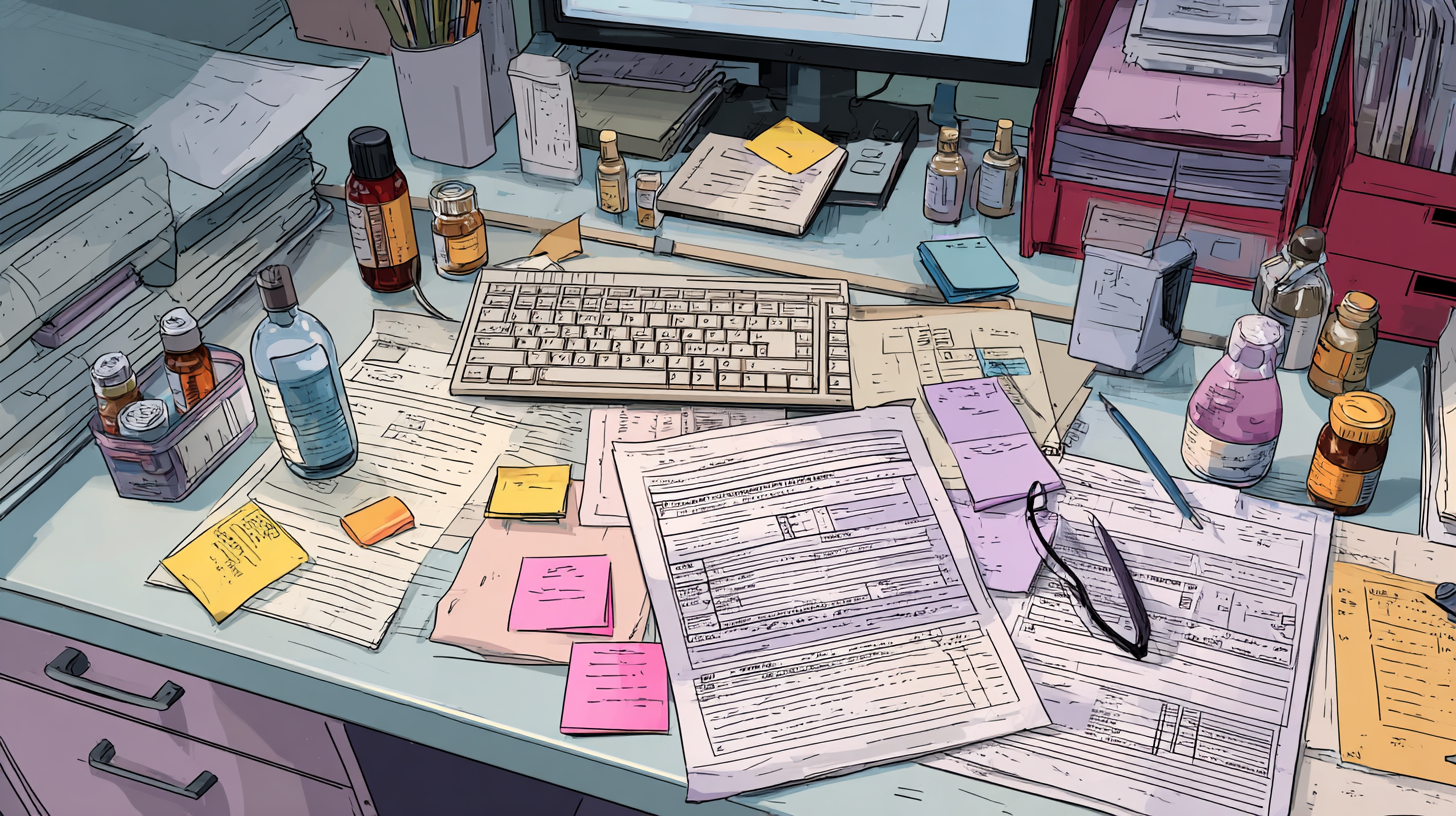Private Diagnoses, Public Consequences: How the UK's ADHD & Autism Assessment Market Profits From Loopholes and Leaves Patients in Limbo
In the UK, private ADHD and autism diagnoses are booming. But critics warn of inadequate assessments, profit-driven practices, and NHS fallout. Who's protecting patients?

It starts with a waiting list. A name added. A form filled. A promise made. Then, nothing. Not for weeks. Not for months. For years.
In the UK, to seek an ADHD or autism diagnosis through the NHS is often to enter a holding pattern with no end in sight. According to NHS England, more than 549,000 people are currently waiting for an ADHD assessment. Of those, 144,000 have been waiting around two years. Some have waited a decade. A 10-year wait for an adult. Nearly seven years for a child. These are not theoretical numbers. They are lives on pause.
This is not just a backlog. It's a breach. And in that breach, a market has bloomed. Clinics promising clarity: fast, frictionless, fee-based. No GP gatekeeping. No drawn-out referrals. Just answers. Now.
Private diagnosis is no longer a side door. For many, it's the only door. But when systems fail, markets don't just fill the void. They reshape it.
That’s why in this week’s Brink I’m diving into the murky world of the UK's ADHD & autism assessment market. I’m exploring how a public system, unable to cope, gives birth to a private system that is, at best disjointed, and at worst deliberately exploiting the anxiety of those seeking help.
A Market Fueled by Desperation

Imagine waiting lists so deep, they're generational. A 2024 BBC investigation found at least 196,000 adults trapped on ADHD assessment waitlists - half of whom would languish another eight years or more before being seen.
In some areas, that harsh reality slips into tragedy. One schoolboy in Oxfordshire was told he might not be assessed until 2043. Councils, with little money and few resources, are exploiting loopholes in a stressed out system. In Coventry and Warwickshire, adults over 25 were told they can only get help through private clinics that charge £1,500 or more.

NHS England flagged another staggering figure: as of March 2025, up to 549,000 people in England were waiting for an ADHD assessment
Yes, half a million people waiting. Lives on pause. Twisting through a system at breaking point. And who steps into the breach? Private providers promising solace:
- "Within weeks, not years."
- "Skip the GP."
- "Fast, flexible, fee-based."
The private sector doesn't just fill the gap. It’s becoming a new reality: anxiety into income. That’s a story we see more and more in the UK. What looks like a public system is in fact, just a public doorway. On the other side is a labyrinth of private providers. Some are great: they deliver care quickly and effectively. But that’s not the complete picture. Some providers are happy to skirt, and sometimes ignore the rules in search of profits.
What Diagnosis Should Look Like

Before I go on, it’s important to help explain what should happen.
According to NICE guidelines, an ADHD or autism assessment must follow a multi-layered process. It should be conducted by a multidisciplinary team-not a lone clinician on a webcam.
For ADHD, that includes:
- A detailed clinical interview exploring childhood behaviour, current symptoms, educational history, and family input.
- Use of standardised rating scales like the Conners or SNAP.
- Collateral input from family, teachers, or partners.
- Observation across settings, if possible.
- Screening for co-occurring conditions-depression, anxiety, sleep disorders, substance misuse.
For autism:
- A developmental history using tools like the ADOS or 3Di.
- Interviews with caregivers where possible.
- Direct behavioural observations.
- Evaluation by professionals trained in autism-specific presentations-especially for women and marginalised populations.
What am I trying to say here? Diagnosis isn't a transaction. It's a process. A process that demands time, rigour, and context-not just symptoms, but meaning.
Yet this is exactly what's being hollowed out. The gap between NICE standards and private practice has grown into a canyon.
The Illusion of Clinical Rigor

They promise thoroughness-assessment protocols, NICE standards, regulated oversight. But behind the slick websites and WhatsApp-links, the real story is far less clear.
BBC Panorama's undercover exposé laid it bare: in one clinic, an ADHD diagnosis came via a 45‑minute video call. No psych history. No multidisciplinary team. Just speed and a stamp of approval.It wasn't complexity. It was convenience.
Clinicians who've seen the full picture aren't fooled. The Royal College of Psychiatrists cautioned that some private providers are cutting corners, "focusing on online assessments that overlook psychiatric and personal history" a pathway ripe for misdiagnosis.

NICE guidelines are clear: a proper ADHD or autism assessment requires multi-disciplinary teams, validated tools, observer reports, real-world history, rigorous follow‑up. Without these, you're diagnosing symptoms, not people.
Yet the reality in private settings often feels more like an illusion: consultations compressed. Formularies reviewed, not clients known. And the result? A system that feels less like care, and more like convenience masquerading as clinical.
Normally, when this this happens, watchdogs and regulators step in. But in the UK, that system has become as flawed as the industry they are trying to police.
Regulatory Black Holes

When medicine meets the marketplace, regulation is supposed to be the firewall. In the UK, several watchdogs are tasked with keeping clinical standards intact, especially when patients are vulnerable, and private clinics are profit-driven.
Here's who's meant to be watching:
- The Care Quality Commission (CQC): England's independent regulator of health and social care services. It inspects providers - both NHS and private - and publishes ratings. It's meant to ensure safety, effectiveness, and transparency. If a clinic is offering ADHD or autism assessments, the CQC should be making sure it's following the rules.
- The General Medical Council (GMC): Regulates doctors. Ensures they're practising safely and ethically. If a clinician overprescribes medication or gives questionable diagnoses, the GMC can investigate and discipline.
- The Health and Care Professions Council (HCPC): Covers psychologists, speech therapists, and other allied professionals involved in neurodevelopmental assessments.
Each of these bodies exists to protect the public. To hold clinics and clinicians accountable. But here's the problem: accountability is lagging far behind the reality on the ground.
The CQC: Lacking Capacity, Losing Trust
The CQC, in particular, has come under fire. In 2024, its chief executive resigned amid a storm of internal dysfunction: high staff turnover, poor morale, and a mounting backlog of uninvestigated complaints.Clinics offering questionable ADHD assessments were slipping through inspections. In some cases, services went uninspected for years, despite repeated red flags from patients and professionals alike.
The commission has also been accused of lacking the clinical expertise to assess the quality of neurodevelopmental services. It's one thing to check a clinic's paperwork. It's another to understand whether the assessments are clinically valid. Without that depth, the CQC ends up inspecting for form, not substance.
Even providers have spoken out. ADHD360, one of the UK's better-known private clinics, publicly criticised the CQC's approach, claiming its inspections were inconsistent, poorly informed, and slow to respond to concerns.

GMC and HCPC: Powerful in Theory, Passive in Practice
The GMC and HCPC have robust enforcement powers. But those powers rely on complaints being made, investigations being opened, and standards being enforced.
In practice? Many clinicians offering private ADHD or autism assessments operate in a grey zone: not breaking clear rules, but falling short of best practice. And that makes disciplinary action rare - even when outcomes are deeply flawed.
Meanwhile, patients are left guessing. Who's checking that their clinician is qualified? Who's reviewing the tools being used? Who's holding anyone accountable if a diagnosis is rushed, incorrect, or denied NHS follow-up?
Right now, the answer often feels like: no one.
Profits Over Patients: The Commercial Determinants of Mental Health

When desperation fills a void, private clinics don't just fill it-they capitalise on it.
Two firms contracted by the NHS to offer ADHD and autism assessments have seen a sharp surge in income, not because they've improved care. It’s simply because more people are simply paying for faster access that the system can't supply.
But this isn't a neutral gap-filler. It's a profit engine. A diagnosis becomes more than a clinical conclusion, it becomes a transaction. This is an important distinction that I need to explain.
The Hidden Risk of Conflicts of Interest
At the heart of medicine (at least in the UK) lies a simple expectation: the doctor's responsibility is to the patient, not the pocket. But in the private assessment boom, financial incentives blur that boundary.
The GMC's guidance is unequivocal: if a medical professional's financial interests could influence-or appear to influence-clinical judgement, they must be declared and managed.
Yet when assessments are being commodified, the lines of influence get murky. The Centre for Health and the Public Interest (CHPI) underscores a broader reality: the NHS was built to prevent profiteering in healthcare-and yet, in areas like ADHD and autism diagnosis, that principle is increasingly tested.
A Two-Tier System-Care, or Commerce
An independent NHS task force recently warned that private ADHD clinics are helping fracture the system into two tiers: one for those who can pay - and one for those who cannot.

This fractured system isn't just unfair. It's dangerous. And beneath it, something even more unsettling is brewing.
In today's UK, a diagnosis isn't just a medical label-it's a passport. Want extra time on exams? A quieter classroom? Support at work? You'll need the right letters next to your name.
This has created a brutal irony: to access care, you must be pathologised. To receive support, you must first be broken.
The rise in ADHD and autism diagnoses isn't just about increased awareness or medical need. It's about bureaucratic necessity. Schools and local authorities often won't recognise neurodiversity without a formal diagnosis. The result? Parents push. Patients plead. Clinics profit.
As The Times reported, diagnosis is becoming the key to unlock everything from funding to educational plans. And so, difference itself is medicalised-not always because it must be, but because the system demands it.
But when the label becomes the lifeline, people chase it-urgently, anxiously, sometimes at the cost of truth. And in that rush, nuance is lost.

Clinics offering rapid assessments-sometimes without multidisciplinary teams or proper follow-ups-aren't just skipping steps. They're risking lives. Misdiagnosis and overdiagnosis become not fringe risks, but predictable outcomes. And this isn't just a personal crisis. It's a public health emergency.
Untreated-or improperly treated-ADHD is linked to job loss, failed relationships, criminal justice involvement, addiction, and suicide. A recent task force warned that the cost of untreated ADHD to the UK economy is £17 billion a year.
So what's the true cost of turning difference into disorder? Of turning identity into eligibility? We are witnessing not just a health crisis-but a philosophical one: A society unsure how to care for its people unless it first names them as ill.
Fallout: Diagnostic Disputes and NHS Reticence

Here’s a key detail that private clinics skirting regulation won’t tell you. A diagnosis doesn't guarantee access to care. The lynchpin is the shared care agreement - a formal deal where, once medication is stable, the GP takes over prescribing under the guidance of the diagnosing specialist.
That's what NICE guidance mandates:
"After titration and dose stabilisation, prescribing and monitoring of ADHD medication should be carried out under Shared Care Protocol arrangements with primary care." Private ADHD
But here's the critical catch: GPs are under no obligation to accept these agreements. It's a professional courtesy, not a right. Some can - and do - refuse if they feel unprepared or overburdened.
When shared care is refused, patients are often forced into privately funded treatment. That can mean continuing private prescriptions indefinitely - or facing the full NHS route again.

Take Wales, where ADHD patients reported being forced to pay for medication because GPs rejected shared care-even after private diagnoses. Acceptance rates were abysmal: just 19% in Wales, compared to 58% in England.
In a heartbreaking letter to The Guardian, parents described their child's private ADHD diagnosis going nowhere because the GP consortium adhered to a blanket refusal policy. That leaves someone with a 70‑year sentence of private prescriptions, at around £82 a month.
Gemma from Lanarkshire, diagnosed privately and medically validated by an NHS psychiatrist, was also turned away. Her GP practice declined shared care; suddenly she was choosing between her medication or essential family needs. She now spends £200 a month on private prescriptions. "I felt crushed."
Why are GP’s pushing back on offering care? In November 2024, several Local Medical Committees urged GPs to withdraw from shared care entirely due to unsustainable workload and inadequate funding. In areas like Essex, LMCs recommended ending care for adults with ADHD-with collective agreements.
Long Waits, Broken Promises
Even when a shared care deal is struck, delays lurk in the shadows. A Healthwatch survey found people facing additional waits of up to two years just for titration-that's the crucial phase of medication dose adjustments after diagnosis.
One patient-after a four-year quest for a diagnosis-was still denied medication because they were "too old for CAMHS" and stuck on another delay to see adult services.

Trapped Between Label and Lifeline
Patients are locked in a trap: they pay for private assessments to escape NHS waits, only to be blocked from NHS-supported treatment. Without a shared care agreement, they face:
- Continuing private prescriptions they may not afford.
- Re-entering NHS queues, often at the back again.
- Emotional wear and tear, caught in a broken system's gear.
And this isn't isolated. It's happening across Wales, Scotland, England, and Northern Ireland-leaving families and individuals emotionally and financially stranded.
This isn't just administrative failure. It's a breach of trust. When treatment hinges on the right label-and then that label doesn't translate into care-you're not just denied medicine. You're denied recognition, stability, and hope.
Who Pays the Price?

Every diagnosis carries a price. But the real question is: who pays it, and when?
At first glance, supporting people with ADHD or autism looks expensive. Extra teachers. Adjusted workplaces. Personalised care. The system tallies these as costs-line items on overstretched budgets.
But that framing misses the point entirely. Because the true cost isn't support. It's neglect. When we delay diagnosis, underfund services, or make care conditional on wealth, we don't avoid expense. We just move it further down the line-and make it bigger.
The Cost of Delay
Delays in ADHD diagnosis are not neutral. They compound. They harden. They spread into other systems:
- Education: Children labelled disruptive instead of supported. Excluded rather than understood.
- Employment: Adults cycling through jobs, unable to access adjustments or treatment.
- Justice: ADHD is dramatically overrepresented in prisons-symptoms mistaken for defiance, impulsivity criminalised.
- Health: Untreated neurodevelopmental conditions often coexist with anxiety, depression, and self-harm.
These aren't hypothetical costs. They're happening - every day - and they're stacking up.

The Illusion of Saving
Systems often reject early intervention because it's "too expensive." But this is a false economy.
Studies show that investing in diagnosis and early treatment yields a return on investment (ROI) as high as 16:1 over ten years. That means for every £1 spent helping someone access care, the system saves £16 down the line-through reduced crisis care, improved employment, and lower justice involvement.
The costs look heavy because the benefits are invisible-they're the breakdowns that didn't happen, the jobs that weren't lost, the lives that stayed on track. But systems don't count what they prevent. Only what they spend.
The Misframing of Value
When we ask, "Who pays the price?" we often mean: what's the financial burden? But we should be asking something deeper: What would it mean to see neurodivergence not as a deficit to be managed, but a form of human potential to be supported?
The real scandal isn't the cost of supporting people. It's the cost of making them fight for that support-until they're too sick, too exhausted, or too disillusioned to continue.
We're not overspending on ADHD or autism. We're understanding them too narrowly and paying the price for that blindness in every school exclusion, every prison sentence, every family that falls apart under the strain.
The Need for Urgent Reform

What's unfolding isn't just a healthcare failure - it's a broader societal failure. A system that labels but doesn't support, charges but doesn't protect, excludes but doesn't reform.
The recent NHS task force laid it bare: waiting times of up to eight years for adults and four years for children are unacceptable. They've called for a shift to a model that's accessible, regulated, and generalist-one that doesn't make private privilege the fastest path to diagnosis.
Moreover, the task force envisions a world where support starts before diagnosis - quiet rooms in schools, flex-work adjustments, and needs-led supports decoupled from medical labels. Here are five things that need to change.
1. Renew Regulation, Restore Trust
All ADHD and autism diagnostic providers-private or NHS - must meet consistent standards. That means formal regulation by bodies like the CQC, with inspections that understand neurodevelopmental care, not just checklists.
2. Build Holistic, Generalist Access
Specialist services alone cannot keep pace. Care must begin in community settings, schools, workplaces, and primary care-stepped and stepped again when complexity demands clinical expertise.

3. Shift the Model: Needs Before Labels
Support should not hinge on receiving a medical label. From the NHS task force to teachers and employers, systemic adjustments should be guided by functional challenges, not diagnoses.
4. Safeguard Shared Care-and Clarity on Right to Choose
GPs need support, not blame. Clear frameworks should guide safe shared care agreements, with private providers offering transparent treatment plans. Patients must never lose NHS oversight because they've paid privately.
5. Digitize Access-and Measure Quality
Digital tools like the QbTest-now endorsed by NICE-can speed early identification, especially for children. The system also needs better data collection to spot gaps, duplication, and inequity.
Reform at this scale isn't about bureaucracy. It's about reimagining support systems as responsive, inclusive, and rights‑based. It's about making care universal, not conditional; early, not delayed; humane, not transactional.
If the real cost is neglect, real reform is our clearest way to pay it back.
A System Not Broken, But Fragmented

This isn't the story of a broken system. It's the story of a fragmented one.
Where care is split across waiting lists and private invoices. Where labels are both lifelines and liabilities.Where diagnosis is the entry point, not the answer-and even that entry point is paywalled.
Private diagnosis isn't the villain. It has given thousands of people clarity, language, and relief. But when it becomes the only route, when standards slip, when regulation lags and profit outruns ethics-It stops being care. It starts becoming commerce.
And in the cracks, people fall. Children misdiagnosed or missed entirely. Adults ping-ponging between clinic and GP. Families forced into debt for the right to be understood.

This isn't just a story about ADHD or autism. It's a story about what happens when systems fail to see suffering until it's medically certified - when difference must be diagnosed to be believed.
We don't need to abolish private assessment. We need to anchor it in integrity. Transparent. Accountable. Aligned with national standards. We need an NHS that doesn't push people away, and a system that doesn't see early support as a luxury.
Because the true scandal isn't that people are seeking answers. It's that the only way to get them is to buy your way out of the backlog-and hope your GP plays along.
Until that changes, we don't have a diagnostic system. We have a lottery. And the cost of losing isn't just financial.
It's human.
















